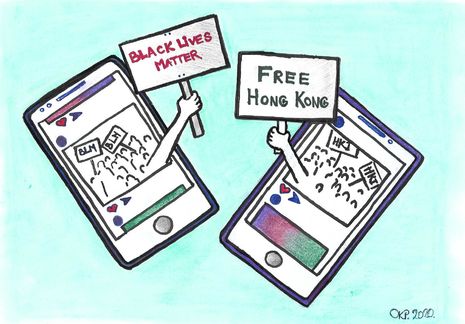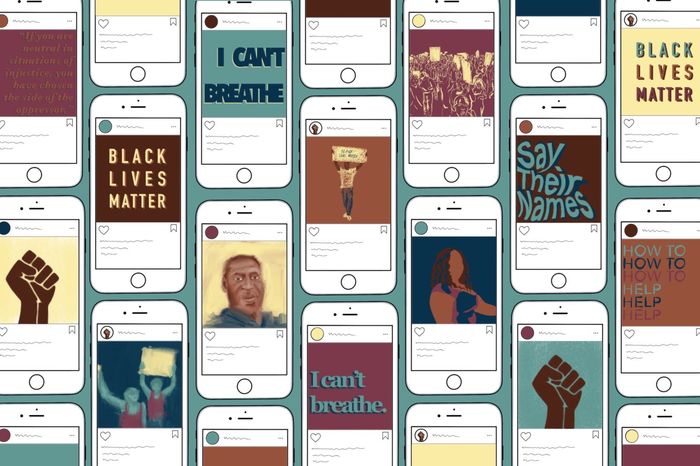Fighting the system (on social media)
Oliver Bramley discusses the beginning of his learning process about the Black Lives Matter movement and the Hong Kong protests, all sparked by one instagram post.

To be clear from the outset, I identify as a white male. I cannot write from the perspective of a person of colour. I am instead going to write about the beginning of a learning process sparked by social media - about what the message and protests of the Black Lives Matter movement has revealed to me about the society in which we live.
Social media is something that connects us to people all over the world. Sitting in my room in Canterbury, it has allowed me to connect in a new way to protests and social movements. Watching videos of marches, hearing the cries of activists and watching statues of slave traders cast into the sea, sometimes it feels like I’m right there with the crowd. Social media has also allowed me to begin a vital learning process toward the recognition of my white privilege, and the systemic oppression upon which our society is constructed.
On my path of learning about Black Lives Matter and the protest movements calling for an end to the racism pervasive in our society, I came to realise that protests do need to take place, despite my initial reservations about supporting them. This was not an ideological matter; my initial reluctance to support direct action was founded purely on concerns of the Coronavirus, and how mass public gatherings could potentially start a second wave. I now recognise that this was a deeply privileged position to take. Seeing videos of activists pleading for an urgent change to the system and police brutality toward people of colour, it became blatantly obvious that this was a last resort in a long history of protest. My fears of a potential second wave were cast aside by the mounting realisation that doing nothing was not an option.
“we can switch off our phones if it gets to be too much. However, people of colour cannot simply log out from a world in which they are systematically oppressed.”
It was social media that changed my mind. I realised that my initial position took a narrow view, one which was in great part enabled by my white privilege. This was a term that I had heard of, but never engaged with. A simple infographic helped to introduce me to the concept in ten seconds. White privilege is used to describe a society in which white people benefit more in comparison to people of colour. It means we’re 40 times less likely to be stopped and searched. It also means we’re 2.5 times less likely to be killed by the police. In ten seconds, I changed my entire view of the protests. In ten seconds scrolling on Instagram, I was allowed to embark upon a learning journey which will be endless, a learning process about the institutional racism in our society, a matter that cannot wait to be addressed.
I probably sound unbearably ignorant to many. The truth is, I was, and continue to be. This is the nature of white privilege - if we don’t see racism in front of us, we assume that it doesn’t exist. I had assumed that racism was an issue only on the extreme side lines of politics. Through recent events and online protest movements it has become painfully apparent that this isn’t the case. I have become aware of just how little I know. Social networks opened my eyes to my white privilege in the first place – allowing me to begin this process of education and change in my own outlook.
I have come to realise that issues at the heart of the Black Lives Matter movement are vital and demand everyone’s attention. If you’re an activist wanting to get involved with these protests but fear physical direct action, all I can say is that my view was changed through social media. If you are able to share or post information and advice, you are helping in the fight. We can all can get involved through social media; there are no more excuses for apathy.
“Social media has allowed many unable to travel to Hong Kong to feel as if they are protesting alongside their family and friends”
Protests in Hong Kong have continued to fight another system many view as a threat to their liberty and livelihood. A vigil on the 4th of June marked the anniversary of the Tiananmen Square Protest, with thousands gathering in Victoria Park to remember the students killed on the same day in 1989. The Chinese government in Beijing continues to increase its influence in the administrative region of Hong Kong, sparking protests from citizens fearing a loss of political freedom.
I am fortunate to have friends in Hong Kong who are able to keep me updated on news and events through their social media feeds and online conversations. It is always a benefit to hear first-hand stories and recounts of marches and gatherings. Social movements of this nature are essentially and necessarily defined by the people who make them up. News reports which frame the protests through an interview with the former British ambassador or a US diplomat are unable to communicate the motives, intent and emotion prevalent in these movements. Communication with friends over social media has allowed me to learn more about the events in Hong Kong, and subsequently to engage with them in a new and I feel, deeper way.
For many who wish to get involved with the protests in Hong Kong, the added influence of Covid-19 to existing limitations of distance make it even harder to engage physically. Social media has allowed many unable to travel to Hong Kong to feel as if they are protesting alongside their family and friends, whilst also allowing others such as myself to gain a deeper understanding of the motives and actions associated with them. For those able to take to the streets, social media has proven a vital tool of communication and organisation.
I hope that my experiences have been shared by many. We can spread key ideas, information and awareness around the world in seconds, and allow thousands if not millions more to engage with political movements such as Black Lives Matter, and those in Hong Kong. Social media could become a decisive new tool in fighting the most important battles of our generation. It has certainly revolutionised the way that I am engaging with politics and how I understand the society in which we live.
The first step is beginning this learning process, one that is long and overwhelming, but we should remember that we can switch off our phones if it gets to be too much. However, people of colour cannot simply log out from a world in which they are systematically oppressed. A lot of work remains to be done, but social media has recruited me to the fight.
If you have been affected by any of the issues raised in this article, the following information and support is available:
- Mind: A mental health charity providing free online resources.
- Samaritans: A 24-hour mental health helpline.
- The Black, African and Asian Therapy Network: A list of free services available across the UK.
- Ways To Help: A collection of resources, including petitions and bail funds, compiled by Black Lives Matter.
- Learn To Be An Active Bystander: Learn how best to challenge antisocial and discriminatory behaviour on campus.
- CamQuaranchats Podcast: The most recent episode of the CamQuaranchats podcast where students talked about their experiences of institutional racism at Cambridge.
 News / Judge Business School advisor resigns over Epstein and Andrew links18 February 2026
News / Judge Business School advisor resigns over Epstein and Andrew links18 February 2026 News / Gov grants £36m to Cambridge supercomputer17 February 2026
News / Gov grants £36m to Cambridge supercomputer17 February 2026 News / Hundreds of Cambridge academics demand vote on fate of vet course20 February 2026
News / Hundreds of Cambridge academics demand vote on fate of vet course20 February 2026 News / CUCA members attend Reform rally in London20 February 2026
News / CUCA members attend Reform rally in London20 February 2026 News / Union speakers condemn ‘hateful’ Katie Hopkins speech14 February 2026
News / Union speakers condemn ‘hateful’ Katie Hopkins speech14 February 2026










